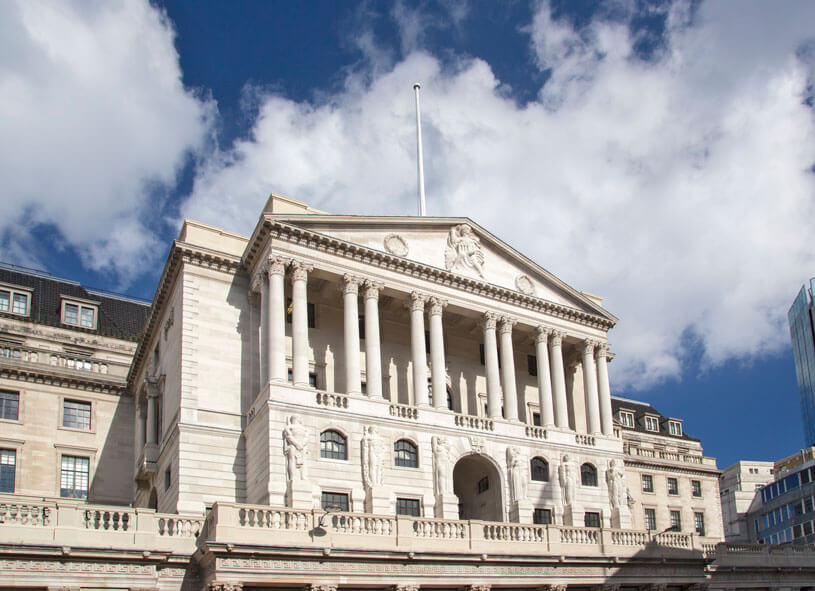The Bank of England Monetary Policy Committee meets several times a year to decide on the base interest rate.
The last time the base interest rate was this high was in 2008. What does this mean for businesses?
What is the Bank of England base rate?
The Bank of England base rate is set by the UK’s central bank. This is the rate that high street banks and other commercial lenders use when setting their own interest rates.
The Bank of England’s Monetary Policy Committee meets eight times a year, where the committee votes on any changes to the base rate.
By setting the base rate, the Bank of England can respond to changes in the UK economy.
The current Bank of England base rate is five per cent, reduced from 5.25 per cent in August 2024. This was the first time the base rate has been lowered since March 2020.
The next Bank of England interest rate decision will be on 19 September 2024.
Will interest rates keep falling?
Now the base rate has been reduced for the first time in over four years, many are wondering whether it will continue to go down. This depends on whether inflation is stable at the government’s target of two per cent. Interest rates affect the cost of borrowing money and the Bank of England raises them to reduce people’s spending and bring down inflation.
Many economists’ predictions that interest rates would fall in the first half of 2024 were slightly wide of the mark. Morgan Stanley researchers have predicted that the base rate could fall to 4.25 per cent by the end of 2024, which is still a possibility.
Andrew Bailey, Governor of the Bank of England, said it’s the bank’s responsibility to ‘make sure inflation stays low and be careful not to cut interest rates too quickly or by too much’.
It’s been suggested that the next interest rate cut could happen in November, after the new government’s first Budget on 30 October.
What do interest rates mean for businesses?
Interest rates signal how much it costs to borrow money, as well as how much savers can earn by putting money aside.
Interest rates are important for businesses, as funding often comes in the form of borrowing money. When interest rates rise, things like small business loans become more expensive. It also means more expensive mortgages.
Changes in interest rates can also affect consumer behaviour. Higher interest rates encourage saving rather than spending and are typically used in response to increasing inflation.
When the cost of goods rises due to pressures on demand, higher interest rates help relieve that pressure (in theory), as consumers hold fire on spending and taking on more debt.
We’ve mentioned ‘interest rates’ as lenders set their own rates based on a range of factors, for example the risk of not being paid back on time.
But, as explained above, it’s also important for small businesses to keep an eye on the Bank of England base rate.
How businesses can respond to the Bank of England base rate
The wider economy is challenging right now, which means businesses may need to revisit their business plan and pivot their strategy in response.
While what you do will vary depending on the specifics of your trade and business, here are some tips for responding to Bank of England base rate changes:
- check your existing borrowing – it’s worth having a look at your terms and conditions to see how quickly base rate changes might affect your business, speaking to your bank if you’re not sure
- think about plans for future borrowing – if you’re wondering about financing growth, you’ll need to consider what a higher interest rate environment means for those plans – and make changes as necessary
- revisit your cash flow forecast – as well as affecting your own repayments, changes in the broader economy impact consumer behaviour, so you may need to revise your forecast – then you’ll have up-to-date information to influence your strategy
- assess your supply chain – higher interest rates affect all the businesses and clients you work with, so try to spot any problems in advance – for example, could agreeing on contracts before rates rise help fix your own costs for the foreseeable future?
Useful guides for small business owners
- How to budget: a calculator and guide for the self-employed
- How to complete a profit and loss statement for your business
- How to write an invoice
- What is business insurance?
How are you responding to rising interest rates and inflation? Let us know in the comments below.
Ready to set up your cover?
As one of the UK’s biggest business insurance providers, we specialise in public liability insurance and protect more trades than anybody else. Why not take a look now and build a quick, tailored quote?

This block is configured using JavaScript. A preview is not available in the editor.